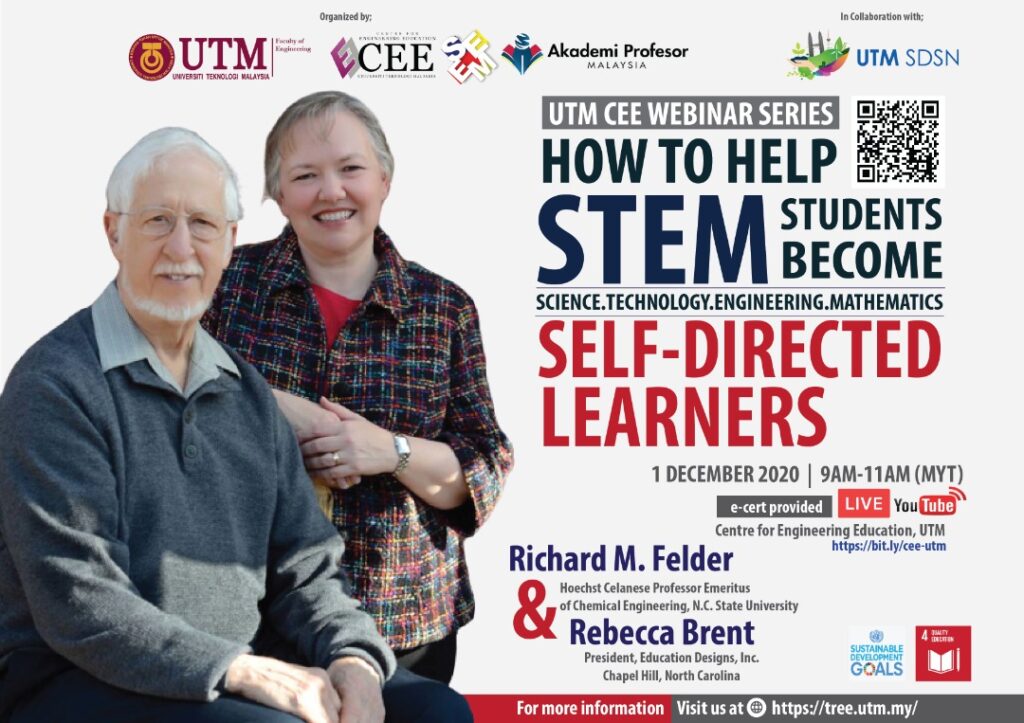Instructors and employers of college science, technology, engineering, and mathematics (STEM) students commonly complain about what the students and recent graduates cannot do. “All they know how to do is memorize,” grumble the professors. “I may go over a problem in class, but if I give them a slightly different problem on an assignment or test, they’re helpless.” “That’s right,” agree the employers. “If they get an assignment on the job that isn’t exactly like something they were taught in school, they have no idea what to do.”
Whether or not the professors and employers use the term, they are bemoaning the fact that their students and new employees are not self-directed learners, able to tackle a new problem and figure out what they need to learn to solve it, where to get the necessary information, and how to work their way to a solution, all without professors and textbooks.
It should not come as a surprise to the instructors that many of their students can’t do those things, because college courses rarely teach how to do them. Some students are naturally talented and learn how on their own, but most don’t do it in school, and they either learn it through painful trial and error after graduation or they never learn and fail.
The skills required for self-directed learning are not obvious to most students, but they are not very difficult and they are teachable. This interactive webinar will provide an introduction to the skills and how to teach them. After participating, you will be able to answer the following questions:
- What is self-directed learning? What do self-directed learners do that most students don’t do?
- How can STEM students who are not self-directed be introduced to the concept, motivated to develop the required skills, and started on the path toward doing so?
- How can development of self-directed learning skills be integrated with traditional STEM instruction (which is how the skills are most likely to be learned) rather than being treated as a separate topic?

Facilitator Biographies
Rebecca Brent, Ed.D.
President, Education Designs, Inc.
Chapel Hill, North Carolina
Email: rbrent@mindspring.com
Twitter: @RebeccaBrent
Dr. Brent is President of Education Designs, Inc., a consulting firm in Chapel Hill, North Carolina. She has more than 35 years of experience in education and specializes in staff development in engineering and the sciences, teacher preparation, and evaluation of educational programs at both precollege and college levels, and has authored or coauthored roughly 120 papers on those topics. She holds a Certificate in Evaluation Practice from the Evaluators’ Institute at George Washington University. Prior to entering private consulting, she was an Associate Professor of Education at East Carolina University where she won an outstanding teacher award. In 2014, Dr. Brent was named a Fellow of the American Society for Engineering Education.
* * *
Richard M. Felder, Ph.D.
Hoechst Celanese Professor Emeritus of Chemical Engineering
North Carolina State University
Email: rmfelder@mindspring.com
Dr. Felder joined the N.C. State University faculty in 1969. He is a co-author of the book Elementary Principles of Chemical Processes, which has been used as the introductory chemical engineering text by roughly 90% of all chemical engineering departments in the United States and many abroad, and he has authored or co-authored over 300 papers on chemical process engineering and engineering education. He has won numerous awards for his teaching, research, and publications, including the International Federation of Engineering Education Societies Global Award for Excellence in Engineering Education (first recipient) and the American Society for Engineering Education Lifetime Achievement Award in Engineering Education (first recipient).
* * *
Drs. Brent and Felder are coauthors of Teaching and Learning STEM: A Practical Guide (Jossey-Bass, 2016, educationdesignsinc.com/book/). Separately and together, they have presented over 500 workshops on effective teaching, course design, mentoring and supporting new faculty members, and faculty development, on campuses and at conferences around the world. They co-directed the American Society for Engineering Education National Effective Teaching Institute from 1991 to 2015. Visit their company website—including a blog with their ideas on teaching and learning—at educationdesignsinc.com, and their Facebook page at www.facebook.com/felderandbrent.
Download your copy of webinar handout here.
